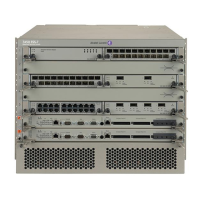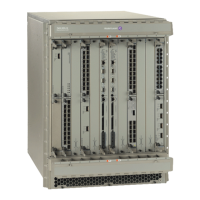IP Router Configuration
Router Configuration Guide 135
sr-ospf
Syntax [no] sr-ospf
Context config>router>static-route-entry>indirect>tunnel-next-hop>resolution-filter
Description This command enables the use of sr-ospf sourced tunnel entries in the TTM to resolve the associated
static route next-hop.
Default no sr-ospf
sr-isis
Syntax [no] sr-isis
Context config>router>static-route-entry>indirect>tunnel-next-hop>resolution-filter
Description This command enables the use of sr-isis sourced tunnel entries in the TTM to resolve the associated
static route next-hop.
Default no sr-isis
sr-te
Syntax [no] sr-te
Context config>router>static-route-entry>indirect>tunnel-next-hop>resolution-filter
Description The sr-te value instructs the code to search for the set of lowest metric SR-TE LSPs to the address of
the indirect next-hop. The LSP metric is provided by MPLS in the tunnel table. The static route treats
a set of SR-TE LSPs with the same lowest metric as an ECMP set. The user has the option of
configuring a list of SR-TE LSP names to be used exclusively instead of searching in the tunnel table.
In that case, all LSPs must have the same LSP metric in order for the static route to use them as an
ECMP set. Otherwise, only the LSPs with the lowest common metric value are selected.
Default no sr-te
validate-next-hop
Syntax [no] validate-next-hop
Context config>router>static-route-entry>next-hop
Description This optional command tracks the state of the next-hop in the IPv4 ARP cache or IPv6 Neighbor
Cache. When the next-hop is not reachable and is removed from the ARP or Neighbor Cache, the next-
hop will no longer be considered valid and the associated static-route state removed from the active
route-table.
